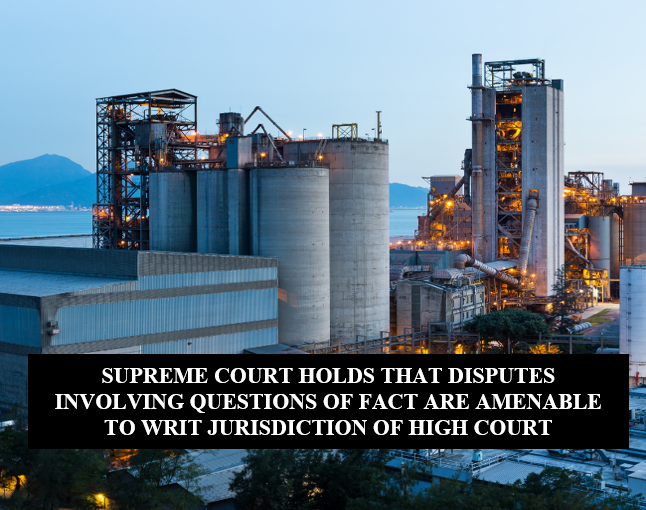SUPREME COURT HOLDS THAT DISPUTES INVOLVING QUESTIONS OF FACT ARE AMENABLE TO WRIT JURISDICTION OF HIGH COURT
A Three Judge Bench of the Hon’ble #SupremeCourt of India comprising of Justices Dr Dhananjaya Y Chandrachud, Vikram Nath and BV Nagarathna has passed a #Judgment dated 25-09-2021 in the case of M/s Magadh Sugar & Energy Ltd. vs. The State of Bihar & Ors. (Civil Appeal No. 5728/2021), and held that #Writ Jurisdiction of a #HighCourt can be invoked on the ground that the #dispute between the parties is #factual in nature.
M/s Magadh Sugar & Energy Ltd. (Appellant) is a sugar mill Company in Bihar. It is engaged in the business of manufacture and sale of white crystal sugar. The waste of sugarcane produced in the process of manufacturing sugar is used for the production of electricity for its own consumption and the surplus energy is supplied to Bihar State Electricity Board (‘BSEB’).
The Bihar Electricity Duty, Act 1948 (Act) empowers the State Government (Respondent) vide Section 3(1) to levy electricity duty based on the units of energy consumed or sold, excluding the losses of energy in transmission and transformation, at the rates specified by the first Respondent, i.e. the State of Bihar.
In pursuance of its power under Section 3(1) of the Act, the Respondent issued a Notification dated 21.10.2002 which stipulated that the rate of duty applicable on the consumption or sale of electricity would be fixed at 6% of the value of energy consumed or sold for any purpose other than irrigation. The said 2002 Notification was amended by a subsequent Notification dated 04.03.2005, which provided that the rate of duty to be levied on consumption of electrical energy generated by captive power plants would be 6% of the value of energy, which shall be equivalent to the energy tariff as fixed by BSEB.
The Appellant challenged the Notifications dated 21.10.2002 and 04.03.2005 before the Patna High Court by filing a Writ Petition. The High Court by its Judgment dated 16.09.2009 struck down the Notifications and Section 3 (1) of the Act on the ground that there were no guidelines in the Act or the Notifications for construing the expression ‘value of energy’.
Aggrieved by the High Court Judgment, the Respondent-State filed a Special Leave Petition before the Supreme Court. While the matter was pending before the Apex Court, the Respondent amended the Act through the Bihar Finance Act 2012 with retrospective effect from 17.10.2002 for defining the term ‘value of energy’. The Appellant challenged the said Amendment by invoking the Writ Jurisdiction of the High Court.
On 03.01.2015, the Appellant received a Notice under Section 6B (1) of the Act, for its failure to file returns and concealment of the sale of electricity of approximately Rs 56 Crores and raised a demand for payment of electricity duty and penalty of about Rs 67 Crores. The Notice was issued on the basis of the Report dated 24.12.2014 of the Accountant General (Audit), Bihar. The said Notice was also challenged by the Appellant before the High Court.
Section 6B (1) of the Act empowers the concerned Authority to give an opportunity to be heard to the assessee, by an order in writing, in case it is satisfied that the assessee has concealed any unit of energy consumed, sold or particulars thereof with a view to reduce amount of duty payable by him under this Act.
However, the High Court vide its Judgment dated 18.09.2017 dismissed the Writ Petition filed by the Appellant on the ground that the liability of the Appellant to file returns would require a factual determination on the nature of supply of electricity to BSEB. The High Court further observed that the Appellant should exercise the alternative statutory remedy provided in the Act.
The Appellant filed a Special Leave Petition challenging the High Court Judgment dated 18.09.2017 before the Supreme Court of India. The Apex Court observed and held as follows:
- That while a High Court would normally not exercise its Writ Jurisdiction under Article 226 of the Constitution if an effective and efficacious alternate remedy is available. But the existence of an alternate remedy does not by itself bar the High Court from exercising its jurisdiction in certain contingencies.
- The test that is to be applied for determination of question of law is whether the rights of the Parties before the Court can be determined without reference to the factual scenario. In this case, the High Court was entrusted with the determination of the meaning of the phrases used in Section 3 of the Act and to determine if the supply of electricity to BSEB by Appellant would fall within its ambit.
- The issues raised by the Appellant are questions of law which require a comprehensive reading of the Bihar Electricity Act. The question that whether the Appellant is liable to file returns under Sections 6B (1) and 5A of the Act is directly related to the issue of whether the sale of electricity by the Appellant to BSEB falls under Section 3(1) of the Act. The questions raised by the Appellant can be adjudicated without delving into any factual dispute. Thus, the Supreme Court held that the present case is amenable to the Writ Jurisdiction of the High Court.
In view of the above, the Apex Court held that the High Court made an error in declining to entertain the Writ Petition and it would be appropriate to restore the proceedings back to the High Court for a fresh disposal. Therefore, the Supreme Court allowed the Appeal and set aside the High Court Judgment dated 18.09.2017, whereby it declined to entertain the Writ Petition of the Appellant on the ground that the dispute between the Parties is factual in nature.
Lakshmi Vishwakarma
Senior Legal Associate
The Indian Lawyer & Allied Services
Edited By
Sushila Ram Varma
Chief Consultant and Editor
The Indian Lawyer & Allied Services





































Leave a Reply